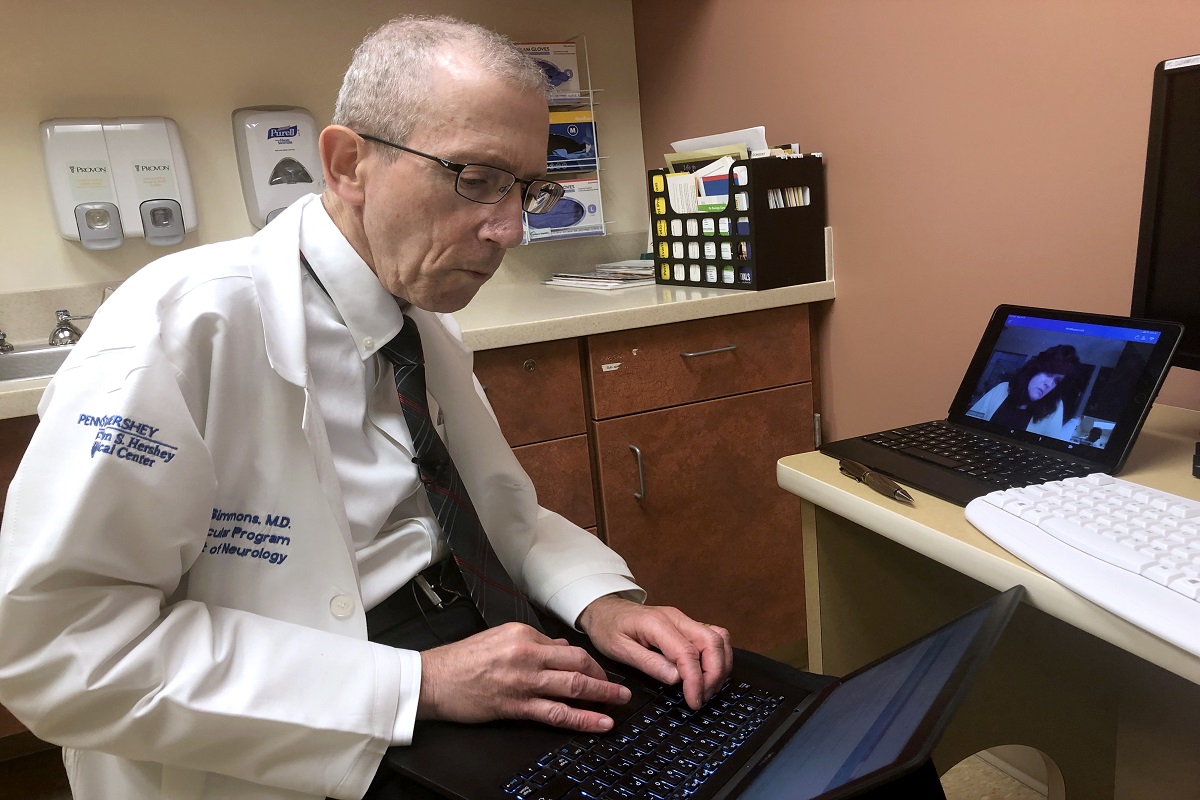College of Medicine joins research team testing the impact of video on visit communication for people with ALS

The Department of Neurology at Penn State College of Medicine and Penn State Neuroscience Institute are part of a research group that has received a five-year, $13 million funding award from the Patient-Centered Outcomes Research Institute (PCORI). Their project will test the effectiveness of video as a communication tool during patient visits for people living with Amyotrophic Lateral Sclerosis (ALS) and their caregivers. The search group, led by Dartmouth, includes eight institutions around the country.
PCORI is an independent, non-profit organization authorized by Congress in 2010 with the mission of funding research that will provide patients, their caregiver’s, and clinicians with the evidence-based information they need to make better-informed healthcare decisions.
Amyotrophic lateral sclerosis (ALS), also known as Lou Gehrig’s disease, is a progressive and fatal neurodegenerative disease affecting about 30,000 people in the United States and an estimated 450,000 people around the world. ALS progresses rapidly, with most patients experiencing a significant decline within 2-5 years.
Zachary Simmons, MD, professor and vice chair for research in the Department of Neurology at the College of Medicine and director of the Penn State ALS Clinic is the site principal investigator for this study. He and his team will enroll participants at the Penn State ALS Clinic, which provides ongoing care to about 250 people with ALS.
While there is no cure for ALS, medications and therapies have been shown to help manage symptoms and slow the progression of the disease. However, this can be an incredibly burdensome process for patients and their caregivers.
“The gold standard of care for ALS has been quarterly multidisciplinary clinic visits for patients and caregivers that last 3-5 hours and involve 10-12 clinicians—including a neurologist, pulmonologist, speech, physical, and occupational therapists, dietician, and social worker—all giving detailed instructions on how to manage their illness and symptoms,” explains Paul Barr, PhD, MSc, an associate professor of The Dartmouth Institute for Health Policy & Clinical Practice and Center for Technology & Behavioral Health at the Geisel School of Medicine and dual-principal investigator (PI) on the project.
“Between clinic visits, the bulk of ALS care is done at home, and we’d like to facilitate that in the best way possible,” said Simmons. “We have long had an interest in how best to communicate our clinic recommendations to our patients and their caregivers and have published research that shows that current verbal and written instructions often fall short. Providing them with access to video recordings of the visits, where they can see themselves receiving information from, and being guided by, a skilled team of healthcare providers could be very helpful.”
For their study, the project team will recruit 50 people living with ALS and their primary care partners at each of the eight collaborating sites (800 total participants): Penn State College of Medicine, Dartmouth, Harvard/Massachusetts General Hospital, Virginia Commonwealth University, University of Wisconsin-Madison, University of Pittsburgh, University of Alabama Birmingham, and Mayo Clinics in Jacksonville, FL and Phoenix, AZ. Sites were recruited from the Northeast ALS Consortium (NEALS), a non-profit organization dedicated to rapidly translating scientific advances into clinical research and new treatments for people living with ALS with over 150 research sites across the country.
Importantly, in addition to utilizing the expertise of scientists and clinical teams, the project will rely on the experiences of patients and caregivers in helping to guide its research efforts.
This study was selected through PCORI’s highly competitive review process in which patients, caregivers, and other stakeholders join scientists to evaluate proposals. Note that this award has been approved pending completion of PCORI’s business and programmatic review and issuance of a formal award contract.
If you're having trouble accessing this content, or would like it in another format, please email Penn State Health Marketing & Communications.
